Tribal nation with over $100M of land on the Strip faces criticism back home
Cattle rancher Todd Hall was standing on land near the Strip, surveying real estate his tribal government had purchased more than 1,000 miles from their reservation.
The Three Affiliated Tribes of the Fort Berthold Indian Reservation spent $115 million for land along Las Vegas Boulevard over the past three years without concrete plans for the sites or public votes on most of the spending. Hall and other critics say the tribal government has lacked transparency, and they contend there are plenty of needs — and other ways to spend the money — back home in North Dakota.
“I’m not against business, but to buy land with no plan doesn’t make sense to me,” Hall said in April during a visit to Las Vegas to protest his leaders’ actions and see what the tribes bought.
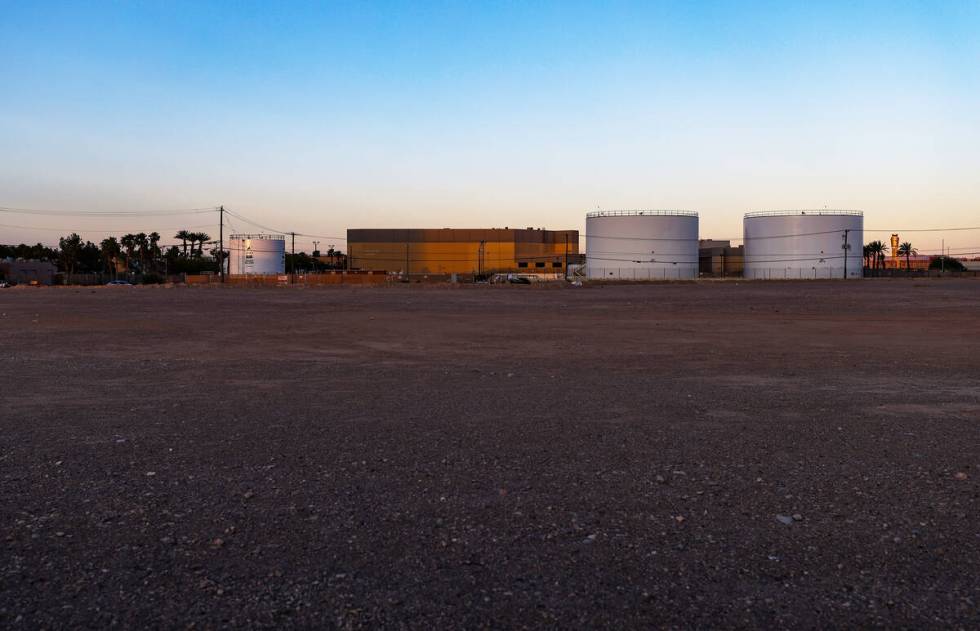
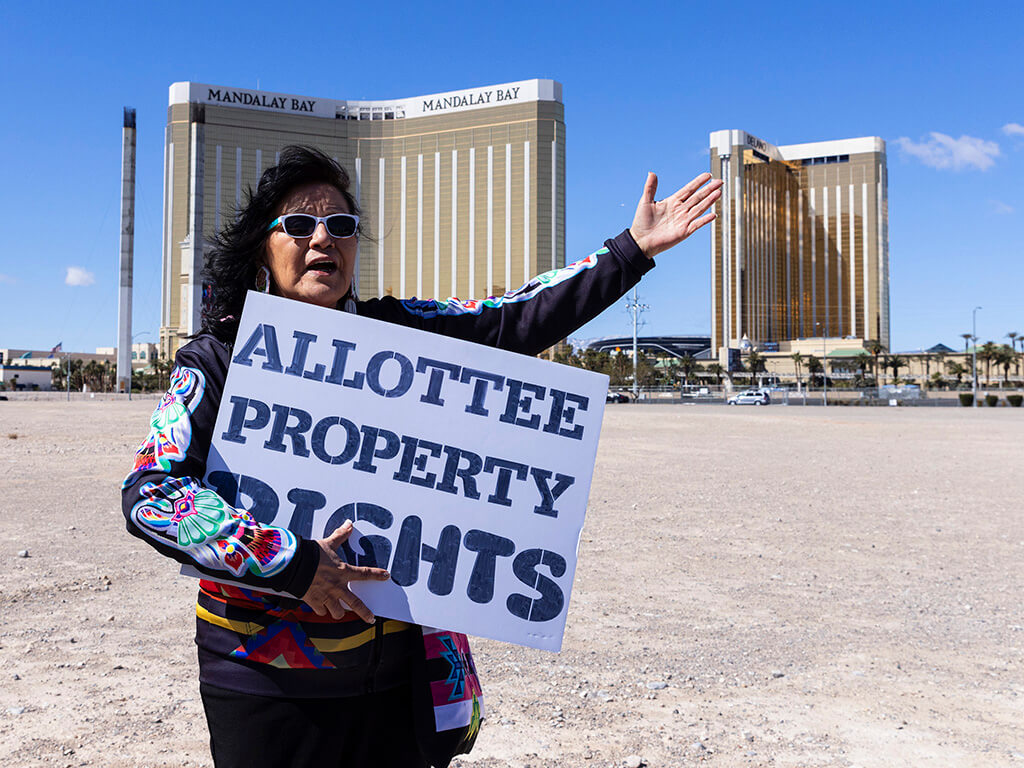 Carol Good Bear, a member of North Dakota's Mandan, Hidatsa and Arikara Nation (MHA), holds a sign as MHA members gathered to protest about the tribal group's land purchase next to the former Route 91 Harvest festival site, on Tuesday, April 4, 2023, in Las Vegas. (Bizuayehu Tesfaye Las Vegas Review-Journal) @btesfaye
Carol Good Bear, a member of North Dakota's Mandan, Hidatsa and Arikara Nation (MHA), holds a sign as MHA members gathered to protest about the tribal group's land purchase next to the former Route 91 Harvest festival site, on Tuesday, April 4, 2023, in Las Vegas. (Bizuayehu Tesfaye Las Vegas Review-Journal) @btesfaye 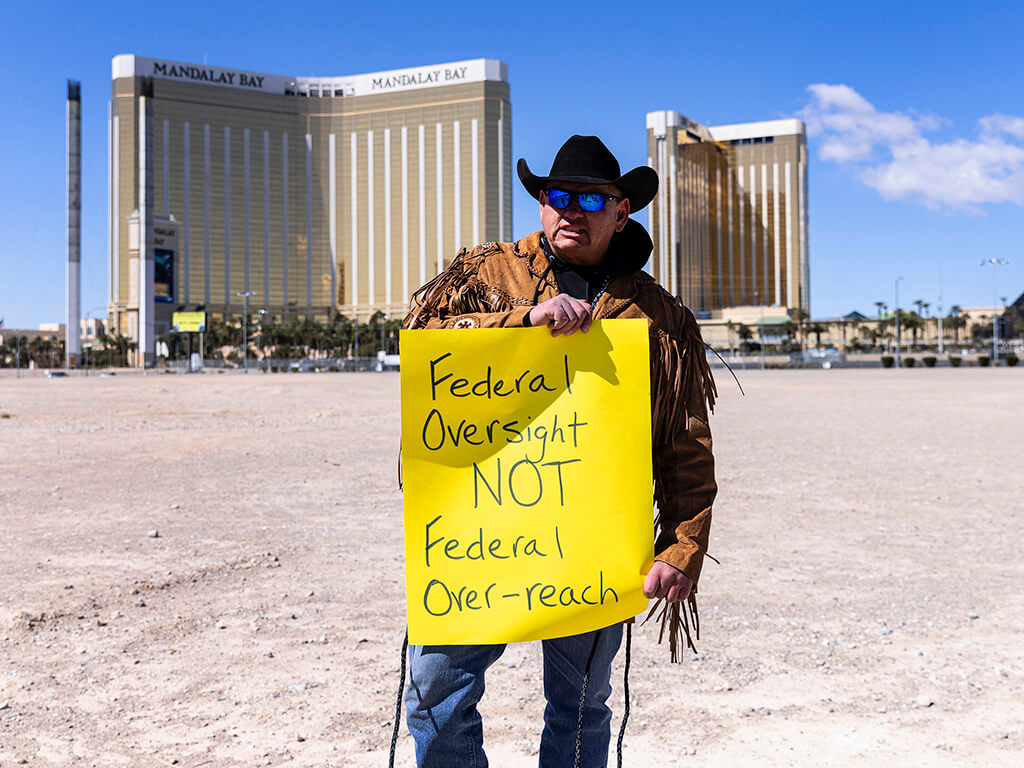 Todd Hall, a member of North Dakota's Mandan, Hidatsa and Arikara Nation (MHA), holds a sign as MHA members gathered to protest about the tribal group's land purchase next to the former Route 91 Harvest festival site, on Tuesday, April 4, 2023, in Las Vegas. (Bizuayehu Tesfaye Las Vegas Review-Journal) @btesfaye
Todd Hall, a member of North Dakota's Mandan, Hidatsa and Arikara Nation (MHA), holds a sign as MHA members gathered to protest about the tribal group's land purchase next to the former Route 91 Harvest festival site, on Tuesday, April 4, 2023, in Las Vegas. (Bizuayehu Tesfaye Las Vegas Review-Journal) @btesfaye
The tribes own 23 acres along the south edge of the Strip, giving the group also known as Mandan, Hidatsa and Arikara Nation plenty of space to develop a real estate project in the famed casino corridor. MHA Nation Chairman Mark Fox has touted the economic opportunities that come with owning land in America’s gambling capital, a lucrative yet fiercely-competitive tourism market.
But his administration has faced criticism over its venture to Southern Nevada.
“Our tribal leadership has no business buying land in Las Vegas when we haven’t taken care of our people back at home,” said Carol Good Bear, who ran unsuccessfully last year to unseat Fox, and joined Hall and other tribal citizens at the Las Vegas protest.
In 2019, the year before MHA Nation started buying real estate in Las Vegas, a tribal council member outlined billions of dollars in spending needs to Congress that ranged from health care and housing to road construction and law enforcement.
At a protest in North Dakota in May, a woman held a sign that declared, “No more off reservation spending!!” and “Build our future here!!” Another sign, propped up against a man in a cowboy hat with stars on his boots, declared: “No Lost Vegas misspending of the people’s money!”
MHA Nation’s governing body, the Tribal Business Council, regularly votes on real estate deals and other expenditures. But the Las Vegas Review-Journal’s inspection of council minutes and other tribal documents posted online since 2020 found no public votes or resolutions on two of its three real estate acquisitions along the Strip.
These include its nearly $93 million purchase last year of most of the former Route 91 Harvest festival site, the scene of the deadliest mass shooting in modern U.S. history in 2017.
“As far as I’m concerned, that’s hallowed ground,” said Hall, who added that it’s like any other battle site on American soil and should be treated with respect, with no casino or other businesses “built on top of it.”
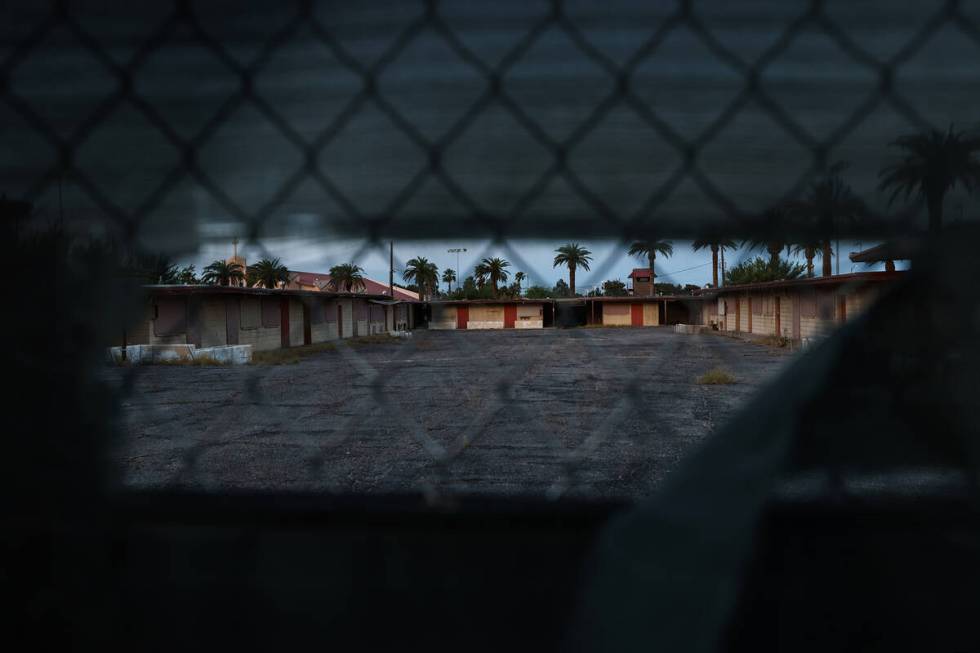
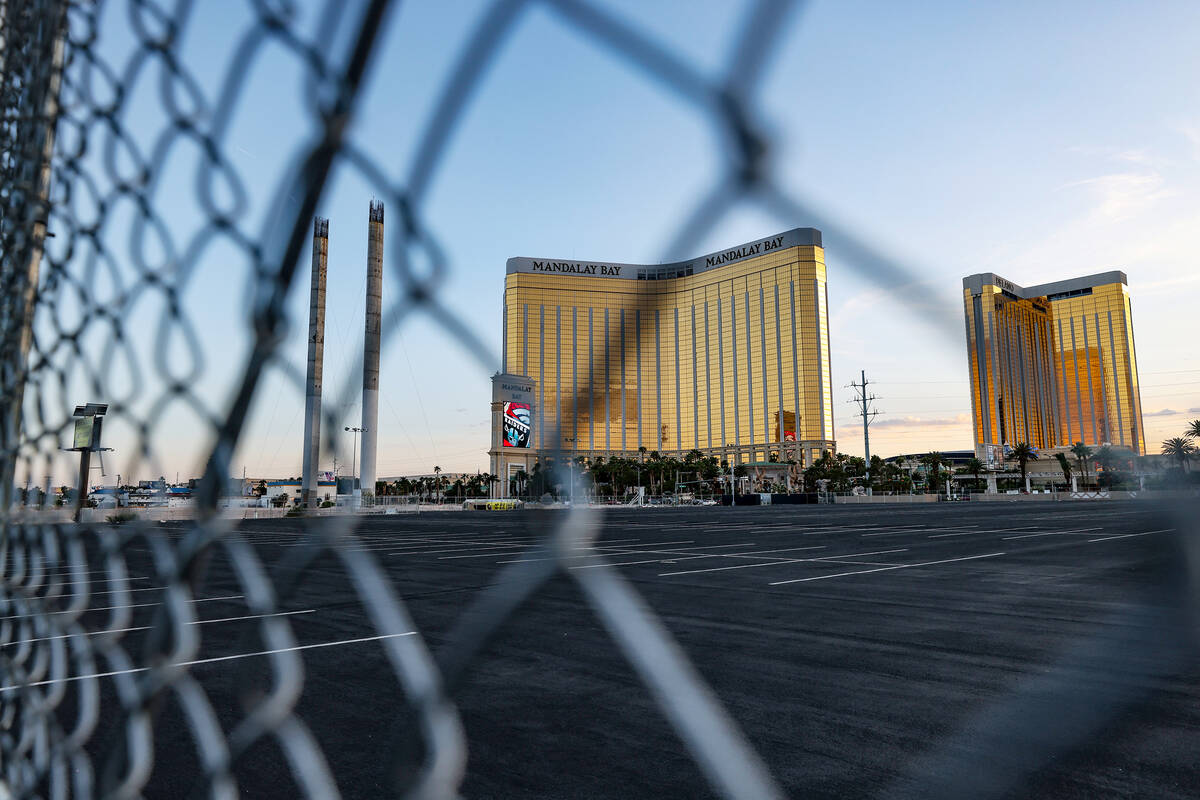
Following multiple requests for an interview, Fox’s office initially said the chairman was booked and provided a written statement for this story.
On Thursday, a few hours after this story was published online, Fox told the Review-Journal that he strongly disputed the notion that tribal leaders don’t take care of the citizens. He cited, among other things, the construction of medical facilities, roads and other infrastructure.
This doesn’t mean the tribes don’t have needs, he said, so the leadership makes investments to generate returns, helping them finance new facilities and services.
“What we did in Las Vegas is exactly in line with that,” Fox said.
Other members of the Tribal Business Council could not be reached for comment or referred questions to Fox, who was first elected chairman in 2014 and is now serving his third term.
Committing to plan ‘when the time is right’
MHA Nation, which owns the 4 Bears casino on the tribes’ oil-rich reservation in North Dakota, entered Las Vegas with its purchase of an 8.7-acre dirt lot for $12 million through a bankruptcy case.
The Tribal Business Council approved a resolution in June 2020 to buy the site. Its meeting minutes that day indicate the deal was discussed in a closed session.
That summer, Fox told the Review-Journal he had been eyeing activity in Las Vegas for years.
The tribes expanded their holdings in December 2022 when they bought 13.3 acres of the former Route 91 site from casino giant MGM Resorts International. The business council held no public hearing or public vote on that purchase.
MHA tribal leaders said revenue from a venture there would help fund tribal programs and projects. They also wholeheartedly supported a proposed memorial site for the Oct. 1, 2017, mass shooting, slated for two acres set aside by MGM.
Fox said MGM required a nondisclosure agreement for the sale negotiations. As a result, tribal leadership couldn’t publicly discuss the deal until it was finalized, he added.
A court filing in January showed that MHA Nation also was buying the long-shuttered White Sands Motel site for more than $10 million through a probate case. The narrow, 1.1-acre plot is surrounded on three sides by the former Route 91 property.
The sale closed in April — again without a public vote in North Dakota.
Fox said that he has the authority to negotiate in court and that it was “well known” that tribal leadership was trying to acquire the property. He also said they bought the site through the courts, an open venue.
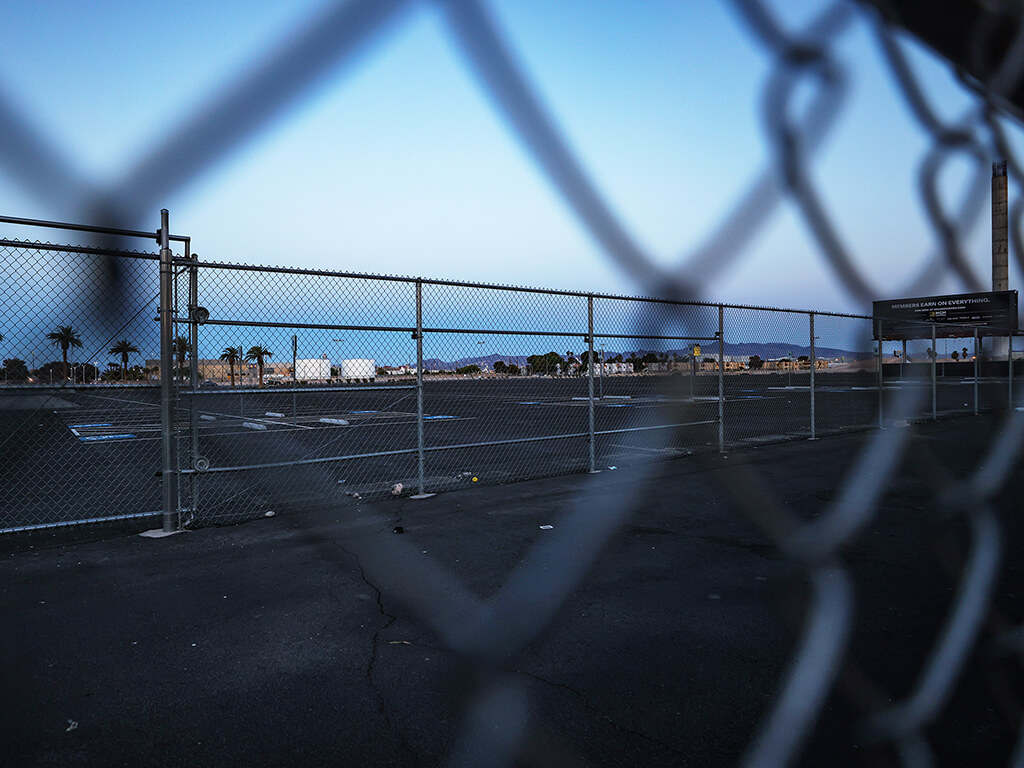 The former Route 91 Harvest festival grounds at 3901 Las Vegas Blvd. South, one of the three sites purchased by the Three Affiliated Tribes of the Fort Berthold Indian Reservation, along the south Strip in Las Vegas, Tuesday, May 23, 2023. The three sites are in close proximity to each other, across from the Mandalay Bay and Luxor casinos. (Rachel Aston/Las Vegas Review-Journal) @rookie__rae
The former Route 91 Harvest festival grounds at 3901 Las Vegas Blvd. South, one of the three sites purchased by the Three Affiliated Tribes of the Fort Berthold Indian Reservation, along the south Strip in Las Vegas, Tuesday, May 23, 2023. The three sites are in close proximity to each other, across from the Mandalay Bay and Luxor casinos. (Rachel Aston/Las Vegas Review-Journal) @rookie__rae 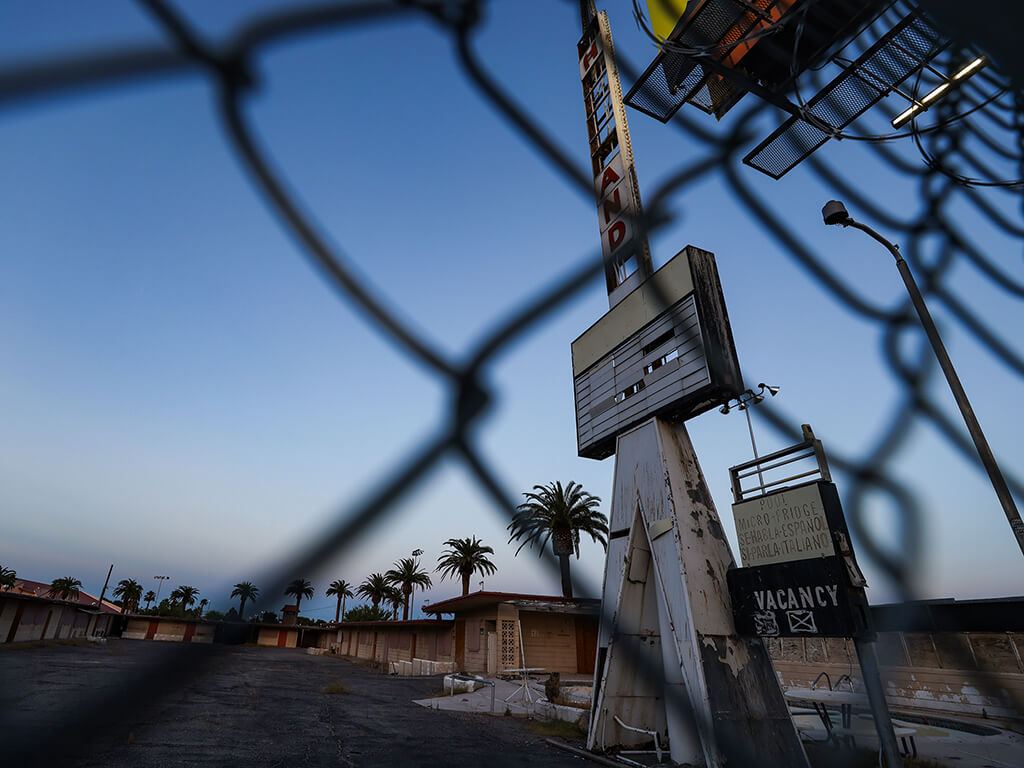 The former White Sands Motel at 3889 Las Vegas Blvd. South, one of the three sites purchased by the Three Affiliated Tribes of the Fort Berthold Indian Reservation, along the south Strip in Las Vegas, Tuesday, May 23, 2023. The three sites are in close proximity to each other, across from the Mandalay Bay and Luxor casinos. (Rachel Aston/Las Vegas Review-Journal) @rookie__rae
The former White Sands Motel at 3889 Las Vegas Blvd. South, one of the three sites purchased by the Three Affiliated Tribes of the Fort Berthold Indian Reservation, along the south Strip in Las Vegas, Tuesday, May 23, 2023. The three sites are in close proximity to each other, across from the Mandalay Bay and Luxor casinos. (Rachel Aston/Las Vegas Review-Journal) @rookie__rae He said that the tribes’ land holdings have climbed in value, but noted MHA leadership is still weighing its options and hasn’t determined what to do with the properties.
“It’s going to take time,” he said.
He previously said their options include developing a casino resort or flipping the land to new owners.
The tribes already found at least one way to make money from their first real estate purchase in Las Vegas. In early 2021, the Tribal Business Council gave the green light to allow “American Ninja Warrior” to use its property for 30 days to film the show, for the price of $100,020.
It’s not uncommon for buyers to pick up land on or near the Strip without finalized plans in place. Plenty of people have also built projects that make big money, or sold land at high values.
But the resort corridor also has a long history of developers pitching big plans that stall or die on the drawing board, and of landowners trying to sell for steep prices that buyers don’t pay.
The former White Sands property, for instance, was on the market several years ago for $25 million — more than double what the tribes bought it for.
MHA’s real estate holdings also are right near the failed SkyVue observation-wheel project — a never-finished tourist attraction that for years has consisted of little more than two giant concrete columns sticking out of the ground across from Mandalay Bay.
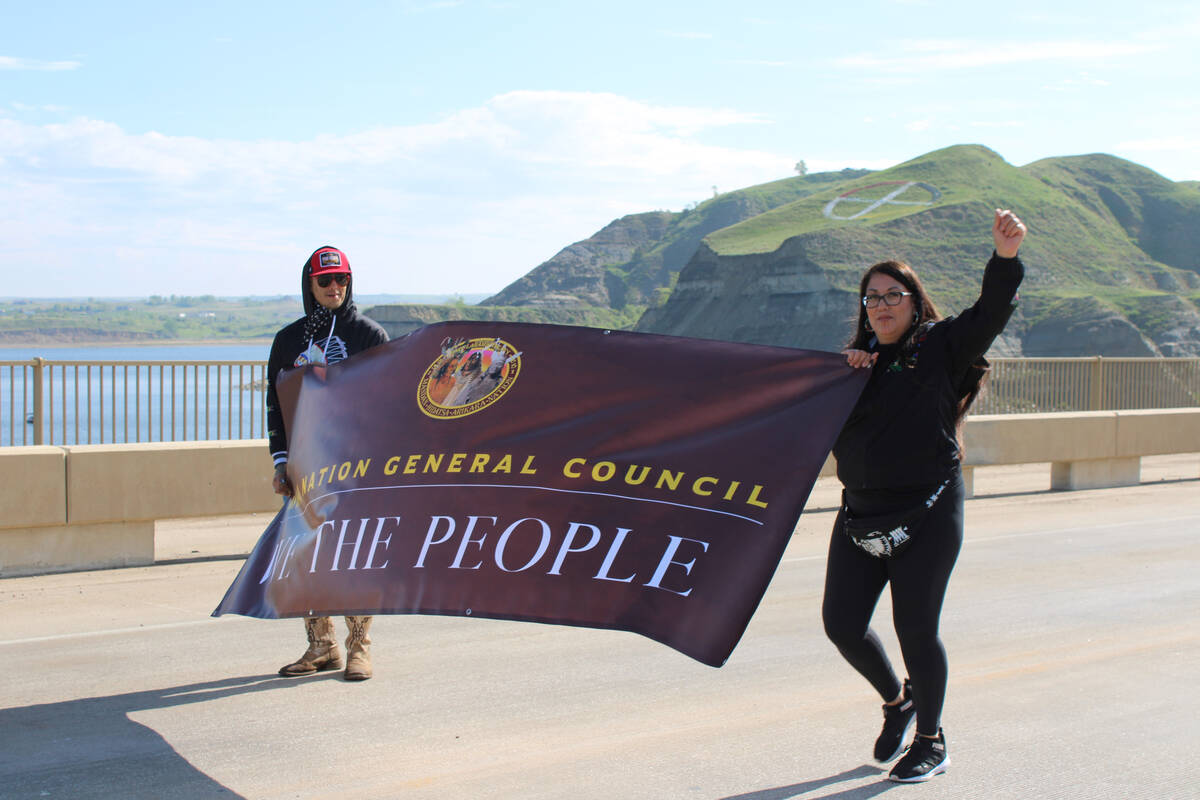
‘Shocked, appalled, and fully opposed’
MHA Nation’s business council holds regular meetings each month and frequently votes on real estate-related matters, including purchases and leases.
It also votes on other spending, including, in recent years, $5,000 to sponsor a gymnastics club, $18,611 for barber shop supplies and $1.8 million for firefighting trucks and other equipment.
Hall, however, wrote in a January opinion piece that he learned of the Route 91 acquisition through the media.
“I, like many, many others, am shocked, appalled, and fully opposed to this purchase,” the rancher wrote.
Hall told the Review-Journal that tribal money spent in Las Vegas could have instead funded education for “our people immediately instead of umpteen years down the road.”
MHA member Kelly Hosie said that the tribal government could have invested in clean air and water back home and that the reservation needs 24-hour emergency medical service.
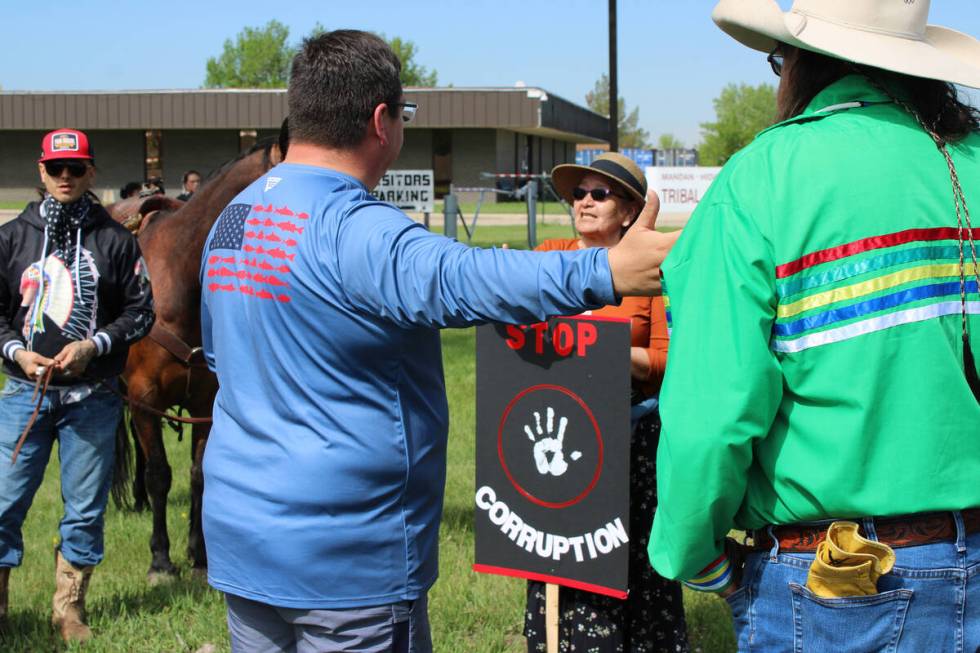
MHA citizens critical of the Fox administration have put public pressure on him. They have held some protests in recent months, including near MHA Nation headquarters, and tribal members nominated the administration for a national journalism “award” that aims to highlight violations of the public’s right to know.
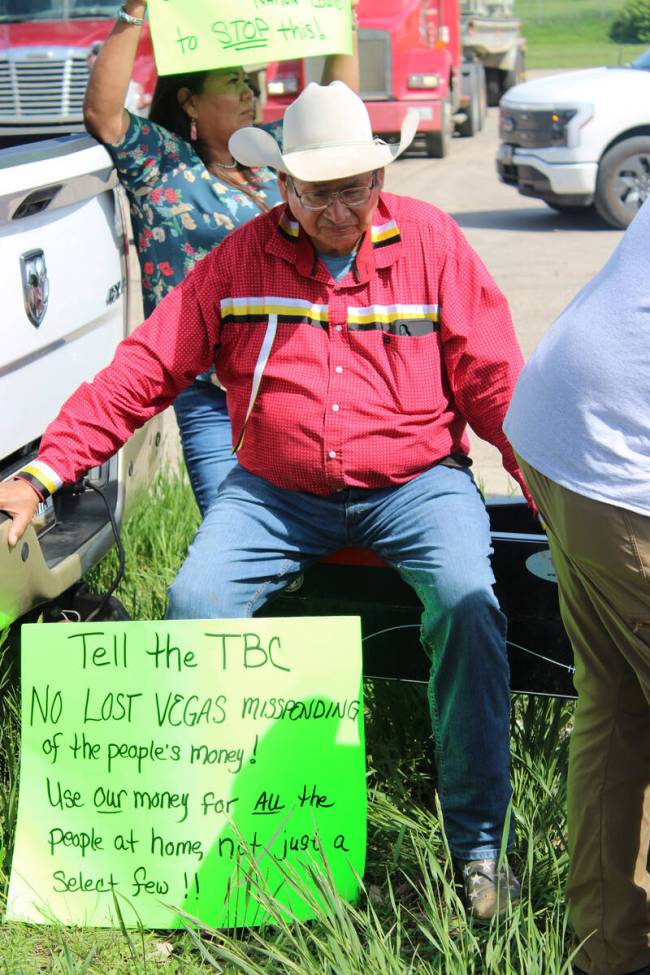
The Society of Professional Journalists cited a “litany of transparency issues” when giving its annual Black Hole Award to the Fox administration this past March.
The journalism group said that to the public’s knowledge, the tribes had not conducted an annual audit since 2018. It also said the administration had purchased at least $90 million worth of real estate but did not inform citizens until the deal was finalized.
Fox said in a written response in March that council members are elected by tribal membership and do not operate in secrecy.
“Disinformation flows freely on social media, misleading our tribal members with stories of corruption,” he wrote. “While inflammatory posts and articles generate clicks, the reality is that the Tribal Business Council and Fox Administration adhere to the MHA Nation Constitution. We honor freedom of the press. We honor transparency. We do not condone false, baseless attacks that cast our nation in a bad, and false, light.”
He said Thursday that the pandemic and the hiring of a new accounting firm caused delays in completing tribal audits.
“We are going to catch up,” he said.
Warm welcome
The Fort Berthold Indian Reservation spans 988,000 acres and, according to the most recent U.S. Census Bureau figures, has an estimated population of just 7,544. MHA Nation says its total enrolled membership tops 17,000.
MHA Nation offers a range of services, including animal control, business development, drug awareness, housing, and food distribution.
It also gets windfalls of revenue from oil production.
From 2017 through 2022, an average of nearly 101 million barrels of oil were produced annually on the reservation, according to data from the North Dakota Department of Mineral Resources.
The tribes received more than $1.5 billion in oil and gas tax revenue from the state between fiscal 2017 and fiscal 2023, according to North Dakota Legislative Council figures.
In the 2000s, oil production on the reservation was a sliver of current levels. Hydraulic fracturing, or fracking, helped enable the boom.
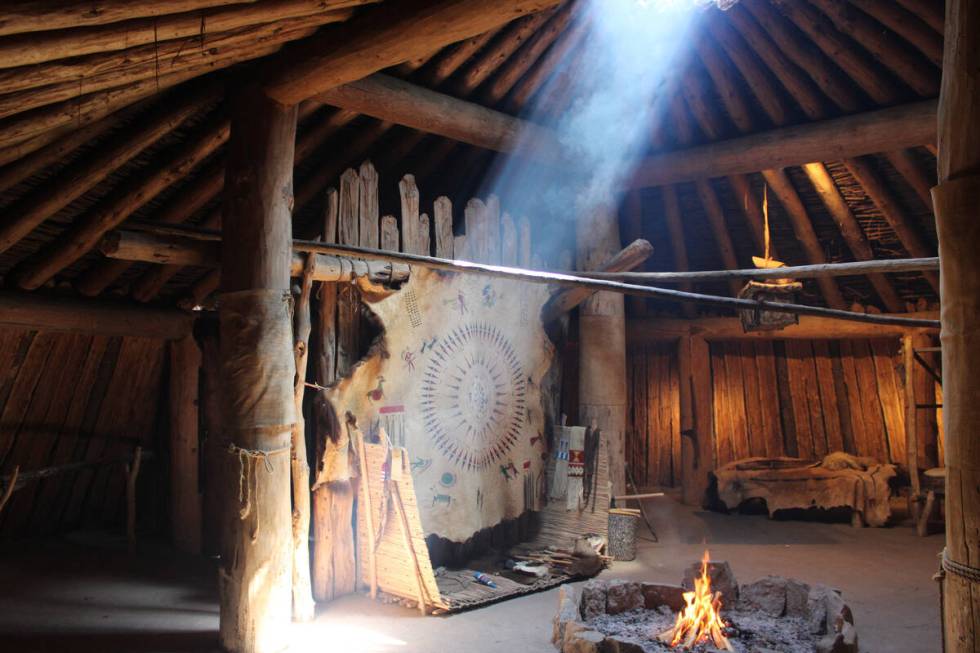
Energy development brought economic opportunities to Fort Berthold but also overwhelmed its transportation infrastructure and strained law enforcement and health care facilities, Tribal Business Council member Monica Mayer said in written testimony to the U.S. House of Representatives in 2019.
With inadequate federal services, she said, the tribes had to acquire private insurance that covers some health care costs for members. She also said that over the next decade, MHA Nation estimated it would need more than $3.6 billion for physical and governing infrastructures and to keep up with growth.
The tribes had an “immediate need for about $825 million for paved road construction and about $685 million to maintain and resurface those roads,” and an “immediate need of $270 million for housing and $160 million for housing related infrastructure,” she wrote.
They also needed $10 million for their drug enforcement agency and $75 million for social services and public safety, according to Mayer.
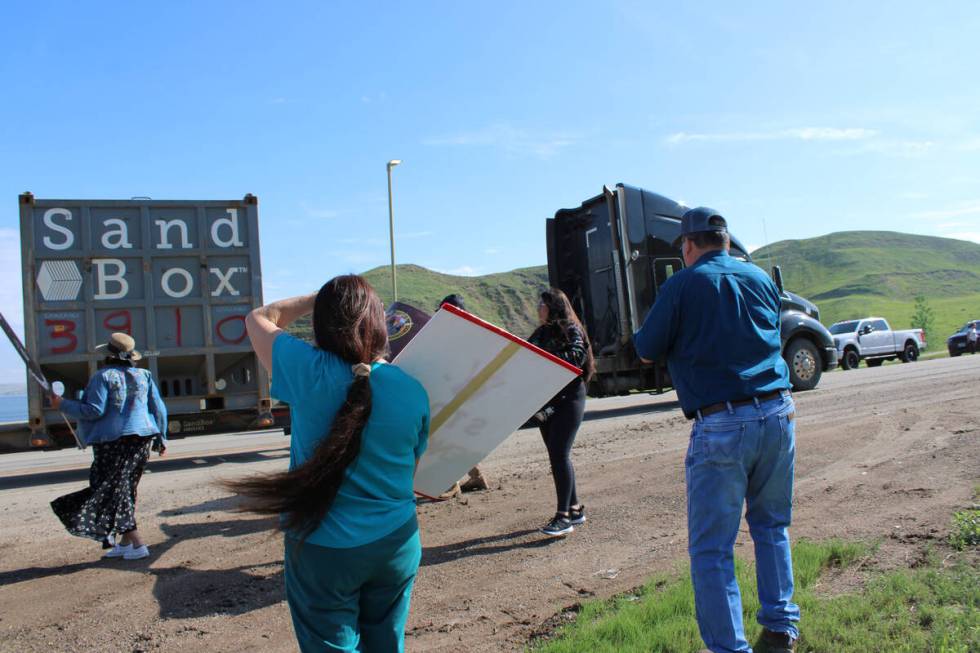
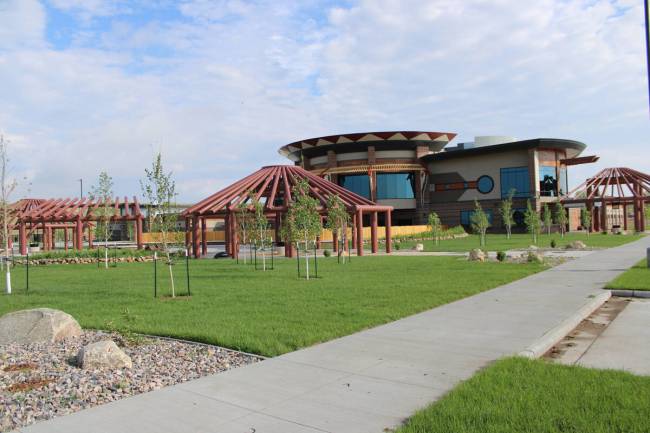
All told, the majority of MHA Nation’s revenue comes from oil and gas development, but these resources will not last forever, Fox said.
And while it’s still unclear what MHA leaders will do with their land assemblage along the Strip, Fox already received a warm welcome in Las Vegas.
At a court hearing in March, District Judge Gloria Sturman came down from the bench to thank the chairman and shake his hand after she approved the tribes’ purchase of the former White Sands property.
“We appreciate the nation joining us in our gaming community,” she said earlier in the hearing.
Contact Eli Segall at esegall@reviewjournal.com or 702-383-0342. Follow @eli_segall on Twitter. Segall is a reporter on the Review-Journal’s investigative team, focusing on reporting that holds leaders, businesses and agencies accountable and exposes wrongdoing.













